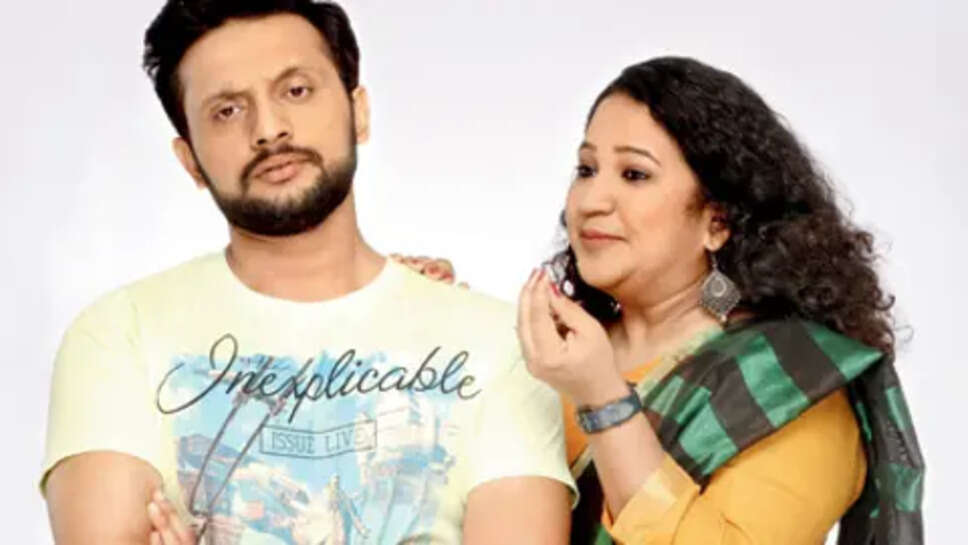Fighting for the Scene: Inside Rasika and Zeeshan’s Dynamic Theatre Partnership

In an industry where egos often clash and creative partnerships can quickly crumble under pressure, Rasika Agashe and Mohammed Zeeshan Ayyub offer a refreshing picture of what artistic collaboration and personal companionship can look like—raw, chaotic, and deeply rooted in mutual respect.
From co-directing stage plays to managing the rhythms of family life, the couple has crafted a unique space where arguments are frequent, but so are breakthroughs. “We fight a lot,” Rasika admits candidly. “Over everything—from interpretation of scenes to how a character should walk across the stage. But at the heart of it, there’s love and admiration.”
The Genesis of a Creative Bond
Rasika and Zeeshan met through the world that shaped them both—theatre. Long before films and television entered the picture, their shared love for storytelling brought them into the same circles, rehearsals, and performances.
Unlike romanticized cinematic pairings, theirs grew in dusty rehearsal rooms, over chai breaks, line readings, and experimental workshops. Rasika was already known for her sharp eye as a director and theatre thinker. Zeeshan, though younger in his journey at the time, brought a fearless energy to every role he took on.
Their connection was never about agreeing on everything—it was about challenging each other. “Zeeshan would often come up with an interpretation I hadn’t even imagined,” Rasika says. “And I’d argue for realism while he’d want abstraction. That clash always led to something new.”
Theatre as a Shared Canvas
The duo co-founded the theatre group ‘Being Association’, which quickly earned a reputation for telling grounded, socially engaged stories. Rasika often directed, while Zeeshan performed. But it was never about one leading the other—it was about sparring creatively until they found common ground.
Rasika explains, “People think just because we’re a couple, we must always agree or intuitively understand each other’s creative choices. But it’s the opposite. We’ll rewrite scenes late into the night, argue over a line’s tone, or even how much light a scene needs.”
Yet those intense debates often result in layered, nuanced performances that audiences connect with. Their theatre pieces have consistently blended sharp commentary with compelling storytelling, drawing from personal, political, and cultural currents.
Love in the Limelight—and Beyond
Working together in the same profession can blur lines. Home becomes rehearsal space. A dinner conversation may veer into character arcs. But Rasika insists the key is to “respect the boundary when needed.”
“There are days we shut off completely from work. We cook, we parent, we go out and not speak a word about theatre or films,” she shares. “We need that switch-off. Or else the exhaustion creeps into the relationship.”
Their life together isn’t about grand gestures or red carpet appearances. It’s built on everyday acts—picking up groceries after rehearsal, running lines while their child plays in the background, attending each other’s premieres with the enthusiasm of a first-time viewer.
They celebrate each other’s successes, but they’re also each other’s most honest critics. “Zeeshan doesn’t flatter,” Rasika laughs. “If he thinks a scene is weak, he’ll tell me right away. And I do the same when I see him in a film.”
Differences that Define Their Style
Interestingly, their creative differences are exactly what make their productions so rich. Rasika leans toward detailed, research-heavy narratives rooted in realism. Zeeshan thrives on emotional spontaneity and metaphor. When these two worlds collide, the outcome is often explosive—and unexpectedly beautiful.
“In a recent play, we couldn’t agree on the ending,” Rasika recounts. “I wanted something grounded and open-ended. He wanted symbolism. We fought for days. Finally, we combined both—leaving the audience with an ending that said a lot without saying it directly.”
These moments, according to Rasika, define true artistic collaboration. “It’s not about being right. It’s about arriving at the best possible version of the truth—together.”
Navigating Cinema, Fame, and Private Lives
While Rasika continues to focus on stage and the occasional screen project, Zeeshan’s Bollywood trajectory has seen a steady rise. From playing complex supporting roles to leading political dramas, he’s now a known face. But for them, fame is incidental.
“We never chased visibility,” says Rasika. “If you’re honest with your craft, recognition finds you. That’s our mantra.”
Despite growing public interest in their personal lives, the couple keeps a tight circle. They avoid media frenzies and maintain a low profile. “The more private you are, the more you can protect your work,” she adds.
Balancing Parenthood and Passion
Their biggest collaboration, however, might be off-stage—raising a child together while pursuing demanding careers. Rasika shares how they split responsibilities, often taking turns being the parent-on-duty, especially during play seasons or shoot schedules.
“There have been times when Zeeshan is away on a shoot, and I’m handling rehearsals with our child asleep in a corner chair,” Rasika chuckles. “It’s chaotic, but it works.”
Parenting, for them, is another form of creative expression—improvisational, full of discovery, and constantly evolving. They hope their child grows up surrounded by stories, ideas, and empathy—things both Rasika and Zeeshan hold sacred.
The Road Ahead: More Theatre, More Conflict, More Growth
Looking ahead, Rasika is planning a new production exploring urban alienation and gender dynamics—subjects she feels aren’t spoken about enough in mainstream narratives. Zeeshan, while focused on film roles, hopes to return to the stage “as a performer first, not a star.”
Asked whether they’ll continue working together as closely in the future, Rasika laughs. “Of course! Who else will tolerate my last-minute script changes and obsessive lighting instructions?”
But beneath the jokes, there’s a palpable sense of deep partnership—built not on similarity, but on trust, creative friction, and shared dreams.
Beyond the Spotlight
Rasika Agashe and Zeeshan Ayyub’s journey together is proof that great art often comes from discomfort—creative debates, conflicting styles, and emotional transparency. Their life is not a picture of perfection. It’s a testament to what happens when two passionate minds meet and refuse to settle.
“We don’t always agree,” Rasika sums up, “but that’s what keeps it exciting. Whether in art or life, we push each other to be better. And that’s what a real partnership is all about.”
